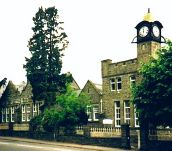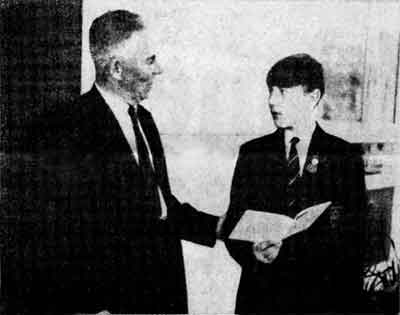A CWMAMAN LAD one of the 850 or so Glamorgan grammar and secondary modern schoolchildren who returned to Swansea last week aboard the Devonia after a 15-day educational cruise — 15-year-old Alun John Hoare, 146, Glanaman Road — will be able to produce a prize-winning log book as tangible evidence of his exciting trip.
The diligent manner in which he kept his log-book up-to-date during his fortnight at sea, meant that out of more than 400 log-books kept by the boys who enjoyed the Devonia cruise, his was judged to be the best.
As a reward for his efforts he was presented with a photograph album by the Devonia’s captain. Into it will go the many photographs he took on the cruise.
Alun, one of eleven Aberdare Boys’ Grammar School fourth-formers aboard the Devonia, interviewed on the day after he had returned home, said: “We were told when we were given the log-books that there would be prizes for the boy and girl who kept the best record of the voyage, but I never thought that I would win. I just kept it like a diary, filling it in every night as neatly as I could. I was absolutely thrilled when I heard that mine had been judged the best.”
MADEIRA
Alun, only son of Mr. and Mrs. Alfred Hoare, added, “I think we all enjoyed the cruise very much, and I’d like to go again on the next one in 1968. We all learned a lot, especially during the days on shore — I enjoyed Madeira best of all. The weather was sunny, but not really very hot.”
Alun has represented the School’s under-15 rugby team, and has also played football for Glynhafod in the local Junior Division. He has been abroad once before, to France three years ago.
Altogether, there were over 100 schoolchildren from throughout the Valley on the cruise.
Alun’s teachers told us they could think of no better way for the “Leader” to tell its readers about the voyage than by quoting from Alun’s winning effort. First day: “Our party arrived at Swansea from Aberdare on May 18 at about 1-30 p.m. We went quickly through the customs and boarded the ship about half-an-hour later. Left Swansea at about 4-30 p.m. and sailed- steadily towards the Bristol Channel and English Channel and towards French coast.”
Second Day: We passed the French coast during night and the weather was quite rough. The day came and the weather was still quite rough. We sailed steadily towards the Spanish coast and at 2 p.m. we were in the middle of the Bay of Biscay. We had two sessions of lessons. Then, in the evening, there was a film on Dick Turpin and a dance. The day ended with the weather still quite rough.”
SPAIN
Third day: “Up at seven o’clock — weather much better. About 7-30 I went up on deck and sighted the coast of Spain almost immediately. We had one session of lessons in the morning. At Santander, owing to a dangerous sandbank across the entrance, we didn’t dock until 1-30 in the afternoon instead of the morning. We went ashore for the afternoon and walked around the town. The people were very friendly and helpful.”
Fourth - day: “Morning ashore. We could go around the town or go bathing, but I chose to go shopping. In the afternoon we visited the ancient village of Santillana with its pebbled roads and old houses, and the caves of Attimira with their drawings of bison, deer and heads of horses on the roofs. There was a sing-song that evening Id the ship’s cafeteria. We left Santander at eight and sailed along the Spanish coast.”
Fifth day: “Sailed along Spanish coast all morning. No lessons today. Weather a little rough. We were shown a film on “Fire Aboard” this afternoon showing us all the things to do and not to do during a fire. Did very little today, except write a few letters and postcards. Went to the assembly hall in the evening to see “Born Free.” In the evening the weather was quite rough and windy on deck and the sea choppy.
Sixth day: “Woke up at 7a.m. and tidied up our dormitory and we received nine marks out of 10 for our dormitory. This was a big improvement. We had three lessons in the morning and one of these was a film on earthquakes and volcanoes. In the afternoon we had sports and our dormitory got through the first round in deck hockey but we were knocked-out in the second. There were also competitions in deck tennis and tug-of-war. In the evening there was a funfair on deck.
Seventh day: “We put our watches back half-an-hour this morning. We had two sessions of lessons today because we were going to land at Madeira tomorrow. We also saw a film about Madeira. We received 10 marks out of 10 for our dormitory. In the afternoon we went below to see the ship’s engines. This was very interesting but I was glad when I got out of there because of the heat and noise.”
DANCERS
Eighth day: “Docked at Madeira at 7-30 a.m. We didn’t have any lessons today as we were on land for most of the day, visiting various places, stopping at a fishing village and a cliff 1,800 feet above sea level. In the afternoon we went ashore in groups and we went around the town shopping. In the night there was dancing on board led by Madeiran dancers. Also that morning we put our watches back half-an-hour.”
Ninth day: “We had a very interesting day at Madeira and we left there at about 2300 hours. We also put our watches on half-an-hour. It was quite warm today on deck but rather windy. We had three lessons this morning — one of these was a film on oil tankers. We finished off our sport competitions this afternoon but our dormitory got no-where. We also had a fire drill practice in the afternoon. The evening brought a fancy dress ball.”
Tenth day: “Put our watches on half-an-hour this morning so that we were once again the same time as the British. We had three lessons in the morning and we learned some Spanish phrases. We also had deck hockey this afternoon.
LISBON
Eleventh day: “Got up at seven o’clock and had breakfast at half-past seven. We went on a tour at, nine o’clock around Lisbon and this was the best tour of the cruise. We visited the monument of Prince Henry, the Navigator and the national sports arena. In the afternoon we went ashore on our own to do some shopping but most of the shops were shut because there was a national holiday. Arrived back on ship at 5-45 and the ship sailed from harbour at 7-30. The weather was quite warm throughout the day but once we started sailing the weather got a little rougher. There was a dance in the night.”
Twelfth day: “We had no lessons today. Went to Church in the morning. At about 2-15 we dropped anchor at Vigo Bay and there we had boat races. Part of our dormitory came last in one of the heats but other boys from our dormitory came third in the final after winning their heat. We left Vigo Bay at 6-30. In the evening — a dance.”
Thirteenth day: “Up at seven o’clock, breakfast at eight. We had three lessons in the morning.”
On this same day, all log- books were returned to the chief officer for his adjudication.
In addition to his personal log, Alan kept a navigational log on which he recorded the ship’s speed and direction, and also the visibility and overall weather conditions. He now has to take the log-book to school and write an essay on his experiences as one of the passengers on this unique cruise.
• In the picture: Alun being congratulated by his headmaster, Mr. J. Warren.


